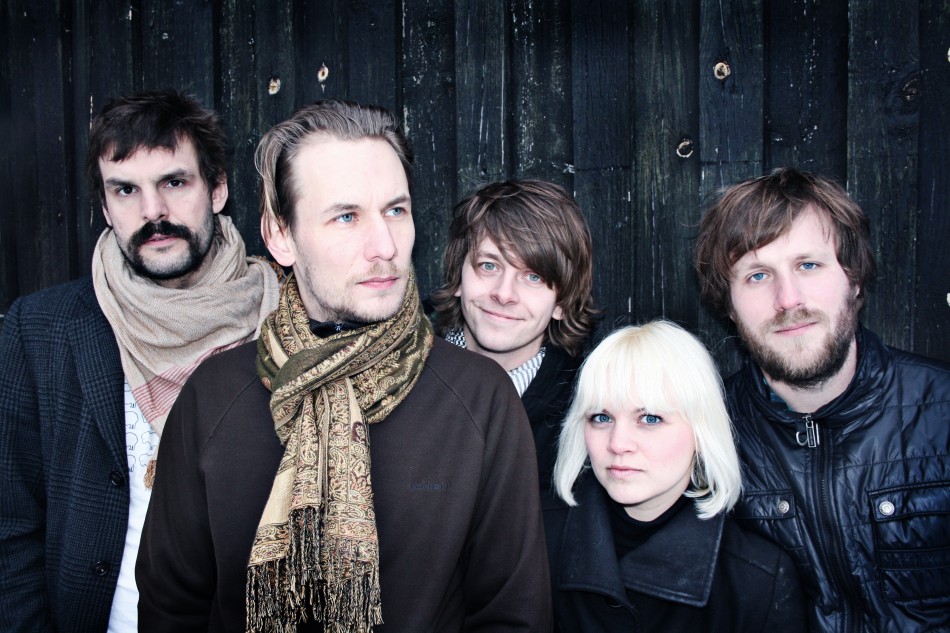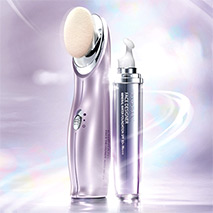Interview with Alcoholic Faith Mission

Recently, I had the chance to sit down and chat with some members of the Danish indie band, Alcoholic Faith Mission just before their show at the Knitting Factory in Williamsburg, Brooklyn and a few days before their trip down to South By Southwest. Alcoholic Faith Mission create choral melodies that are very emotionally driven and powerful, incorporating both organic and non-organic instruments into their performances. They are a joy to watch, especially due to the mesmerizing group dynamic they possess. Since the band was treading on familiar turf, having created one entire album based on a street not to far from there, the chat we had was especially laid back and fun.
Special thanks to Sune Sølund (bass, vocals), Kristine Permild (keyboard, synthesizer, vocals), and Morten Hyldahl (drums, vocals).
How did you guys get started?
Sune: Thorn and I started the band back in 2006. At that time, we had a friend living over here in New York, so we were visiting him for a couple of weeks. At that time, we had had our band for about 5 years, but we weren’t playing music. One day while we were walking around Clinton Hill, Brooklyn, we came across this church called The Apostolic Faith Mission, and we saw the sign, “Apostolic Faith Mission” which was talking about family members and alcoholism. We have some alcoholics in our families, so this idea came up about changing “Apostolic†to “Alcoholic†and making a band name from this name… and six months later, we released our debut album.
Kristine: As I understand it (I wasn’t there), it started as a joke, but the name just stuck.
Sune: Yeah, we thought it could be a cool band name. And then we moved back over here for a half a year in 2008, along Wythe Avenue. That’s why we called our second album 421 Wythe Avenue.
What’s your impression of the music scene in Brooklyn?
Sune: Obviously it’s great here. For that half year some of us were living in Williamsburg, we went to so many shows around here… so much different stuff, practically every day or every other day. We were very inspired, and that’s why we named our second album what we did. We really love the music scene here.
How does this compare to the scene in Copenhagen?
Kristine: There are some really interesting things going on in Denmark right now, too, especially in Copenhagen. Brooklyn bands have been sort of riding on this hip wave, and I think in a way, it’s come to Copenhagen as well. We have experienced that it’s kind of hip to be Scandinavian right now. The music scene is really cool right now… there are a lot of bands playing outside Denmark, but there are some really good opportunities in Copenhagen, too – especially for bands to apply for funds. Music Export Denmark is a whole official organization working to promote and export Danish music, so that’s quite unique and it creates really good possibilities for bands like us because we can apply for funds.
How do you all keep the rest of your lives going when you’re touring a lot?
Kristine: Well, we still haven’t gotten to the point where we’re touring all the time. Music is everything to us, but we can’t tour all the time. Maybe it’s because we don’t earn enough money yet. We have to have day jobs back home. I work at a theater in the area of administration.
Sune: I’m a journalist.
Morten: And I work in a kindergarten and I give drum lessons sometimes. But this is just to be able to play in a band. We would do this all the time if we could.
Sune: It’s so expensive to travel over here. Getting a work permit and living over here is very expensive.
What was the turning point for your band?
Kristine: To be honest, I think that the turning point for us was Music Week, which we recently played at. After Iceland Airwaves last year, we came over here and played at CMJ, which was really cool as well. When we were playing in Toronto last week, that was the first time we had some really important people coming to our shows.
Sune: You don’t think the New York Times is important?
Kristine: Of course it is! But that experience was just so much more intense.
Sune: Definitely…. A bit more intense, but Airwaves and CMJ were definitely turning points as well.
Kristine: One step up every time.
Why do you guys always sing in English?
Kristine: Well, I think there are two reasons. It’s really hard to write lyrics in Danish, I don’t know why; I find they’re not so pretty. I know some bands that succeed in singing in Danish and manage to make it sound really good. Since we speak deep down in our throats, it’s not really a good language to sing in, as I see it. Also, if you sing in English, you get a much broader audience. It’s easier to tour in America when you sing in English. It has been done with Danish lyrics, but it just doesn’t happen so often.
Sune: It’s not cool for us to play in Denmark, but it’s cool for us to tour the world.
What are you guys listening to these days?
Kristine: There’s one band that’s really popular on the tour bus right now, and that’s Baths.
Sune: He’s playing South By as well.
Kristine: Yeah, he’s really cool. He’s sort of minimalistic electronic pop.
How do your music tastes compare?
Kristine: They don’t… not at all.
Morten: Gustav Rasmussen (trombone, vocals, guitar) has a jazz background, and his music is really weird; I don’t understand it at all. It’s like modern jazz… free jazz… yeah, it’s really, really weird. I have a bit of a jazz background, as well, but I listen to more of Neil Young – the whole singer/songwriter thing. But I also like new bands – like the Dirty Projectors… and Broken Social Scene.
Kristine: Well ok, I think we can all agree on Broken Social Scene.
What rituals do you have to prepare for a show?
Sune: We love to do a hug before a show. We try to do that.
Kristine: We found out at some point that if we stood together and looked each other in the eyes and got that connection before we went onstage, we would play together better because we had the connection already. So we really try to take a moment and say, “We’re all here. I’m here, you’re there. Let’s go in there and play together.” We really prioritize that.
Sune: It really makes a difference, you can feel it.
Kristine: We’re a band. We’re a group. We’re not individuals.
What’s the number one benefit of being able to do all of this?
Kristine: It’s amazing to get to travel. It’s just such a good way to see a new city. If you go somewhere as a tourist, it’s really hard to get under the surface, but if you travel as a band, you’re sort of forced under the surface because you take part in the whole setting up, meet people after the show, go out for beers and stuff.. it’s a great way to travel.
Sune: And luckily we are all very good friends. So if we weren’t good friends, it would be very exhausting.
Kristine: That’s true. We usually live in like very tiny places – like right now, we’re seven people sharing a two-bedroom. So we get to know each other very well.


